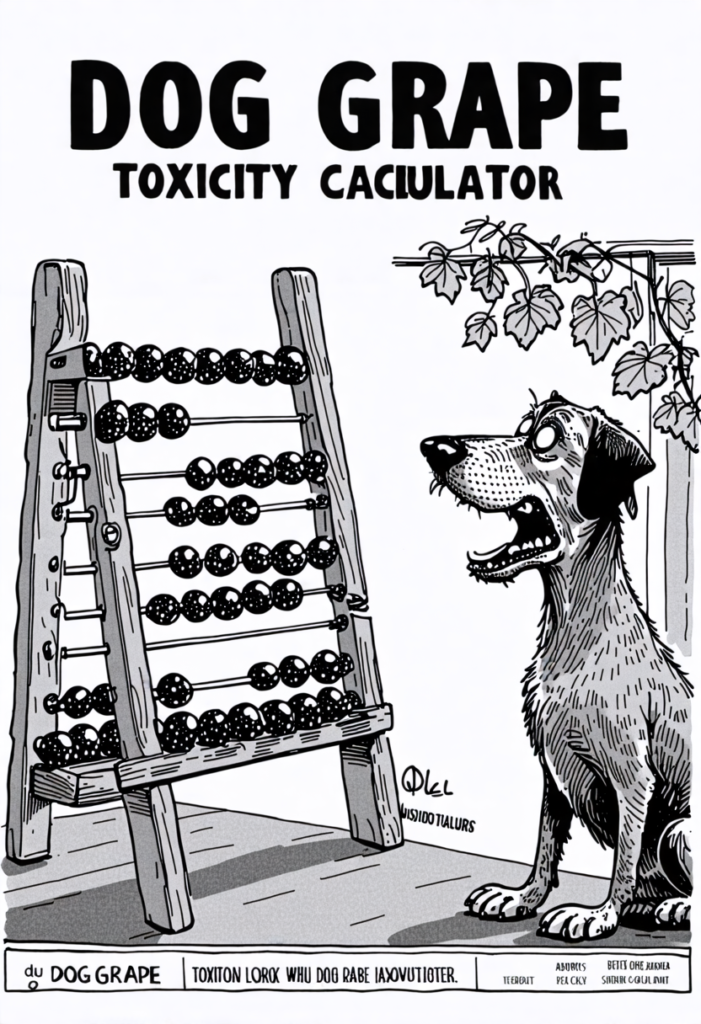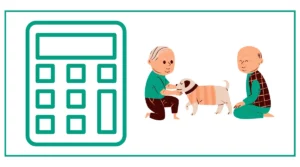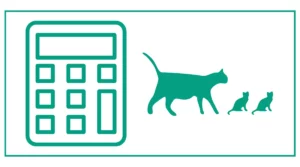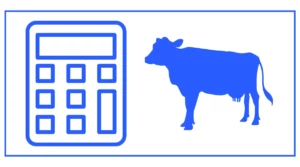Dog Grape Toxicity Calculator
Result :
Toxic amount of raisins : 0 gram
Toxic number of raisins (approx.) : 0
Grapes and raisins may harm dogs. Dogs can develop acute kidney injury and anuria from their toxicity.
You can use our dog grape toxicity calculator to determine toxic raisin amounts based on your dog’s weight and the size of the raisins.
Raisin or grape toxicosis causes vomiting and diarrhoea in most dogs within 6–12 hours of ingestion. Also look for lethargy, anorexia, abdominal pain, weakness, dehydration, polydipsia, and tremors.
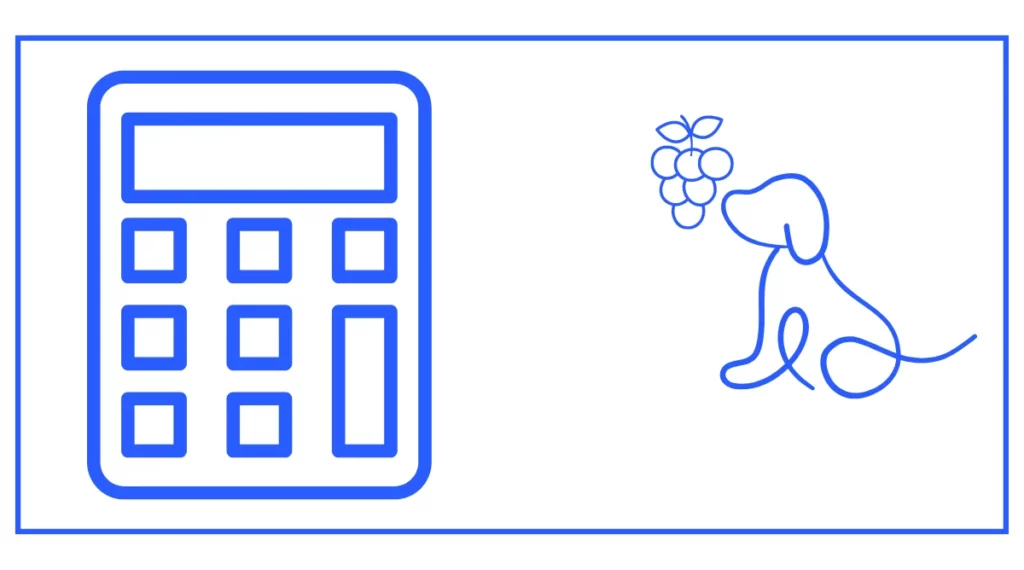
You might find the Dog Pregnancy estimator and Dog Heat Cycle finder tools useful.
Grape and raisin toxicity in dogs is a serious concern for pet owners. While these fruits are harmless and even beneficial for humans, they can be highly toxic to our canine companions. This article will explore the dangers of grape and raisin consumption in dogs, the symptoms to watch for, and how to use a toxicity calculator to assess the risk if your dog has eaten grapes or raisins.
Why Are Grapes and Raisins Toxic to Dogs?
The exact mechanism behind grape and raisin toxicity in dogs is not fully understood. Researchers have proposed several theories, including:
- Tartaric acid: Some studies suggest that the tartaric acid levels in grapes may be responsible for the toxic effects in dogs. However, the acid levels in grapes vary, which could explain why some dogs are affected more severely than others.
- Mycotoxins: There’s a possibility that fungal byproducts on grape skins could be the culprit.
- Salicylate: This naturally occurring compound in grapes might contribute to toxicity in dogs.
- Individual susceptibility: Some dogs may be more sensitive to grape and raisin toxicity due to genetic factors or other individual differences.
Regardless of the exact cause, it’s crucial for dog owners to understand that grapes and raisins are toxic to dogs and should be avoided at all costs.
Symptoms of Grape and Raisin Poisoning in Dogs
If your dog has eaten grapes or raisins, it’s essential to be aware of the potential symptoms of toxicity. These signs can appear within a few hours after ingestion and may include:
- Vomiting
- Diarrhea
- Lethargy
- Abdominal pain
- Decreased urine output
- Dehydration
- Weakness
- Tremors
- Seizures
- Kidney failure
It’s important to note that the severity of symptoms can vary depending on the amount consumed and the individual dog’s sensitivity. Some dogs may show signs of poisoning after eating just one grape, while others may consume larger quantities without apparent effects. However, this doesn’t mean that grapes or raisins are safe for any dog to eat.
Using the Grape and Raisin Toxicity Calculator
To help pet owners assess the potential risk if their dog has eaten grapes or raisins, we’ve provided a toxicity calculator. This tool can give you an estimate of the toxic dose based on your dog’s weight. Here’s how to use it:
- Enter your dog’s weight in the provided field.
- Select the unit of measurement (kg or lb).
- Choose the size of raisins (small or large).
- Click the “Calculate” button.
The calculator will then display the estimated toxic amount of raisins in grams and the approximate number of raisins that could be dangerous for your dog.
It’s crucial to remember that this calculator provides an estimate and should not replace professional veterinary advice. If your dog has consumed any amount of grapes or raisins, it’s best to contact your veterinarian immediately.
What to Do If Your Dog Eats Grapes or Raisins
If you suspect or know that your dog has eaten grapes or raisins, take the following steps:
- Remove any remaining grapes or raisins from your dog’s reach.
- Try to determine how many grapes or raisins your dog has eaten and when.
- Contact your veterinarian or an emergency animal poison control center immediately.
- Do not induce vomiting unless instructed to do so by a professional.
- Be prepared to take your dog to the veterinary clinic for treatment.
Treatment for Grape and Raisin Poisoning
The treatment for grape and raisin poisoning in dogs typically involves:
- Decontamination: If the ingestion was recent, the veterinarian might induce vomiting to remove as much of the toxic substance as possible from the dog’s system.
- Activated charcoal: This may be administered to help absorb any remaining toxins in the gastrointestinal tract.
- Intravenous fluids: To support kidney function and prevent dehydration, dogs are often given IV fluids.
- Medication: Various medications may be used to manage symptoms and support organ function.
- Monitoring: Blood tests and urine output will be closely monitored to assess kidney function.
- Dialysis: In severe cases of kidney failure, dialysis may be necessary.
The prognosis for dogs that receive prompt treatment is generally good. However, if treatment is delayed or if a large quantity of grapes or raisins was consumed, the outcome can be more uncertain.
Preventing Grape and Raisin Poisoning in Dogs
Prevention is key when it comes to grape and raisin toxicity. Here are some tips to keep your dog safe:
- Keep grapes and raisins out of reach: Store these fruits in secure locations where your dog cannot access them.
- Educate family members: Make sure everyone in your household knows about the dangers of grapes and raisins for dogs.
- Be cautious with food products: Many baked goods and cereals contain raisins. Always check ingredients before sharing human food with your dog.
- Avoid grape-flavored products: While artificial grape flavoring is not toxic, it’s best to avoid these products to prevent confusion.
- Be mindful of outdoor areas: If you have grapevines in your yard, ensure your dog cannot access the fruit.
Other Foods Toxic to Dogs
While grapes and raisins are particularly dangerous, there are other common foods that can be toxic to dogs. These include:
- Chocolate
- Onions and garlic
- Macadamia nuts
- Xylitol (an artificial sweetener)
- Alcohol
- Avocado
- Caffeine
- Raw or undercooked meat
- Salty snacks
Always research any human food before giving it to your dog, and when in doubt, stick to dog-specific treats and foods.
